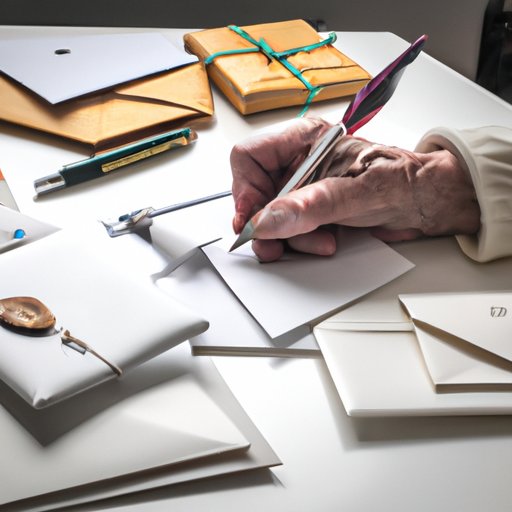
Introduction
In this day and age, it’s easy to overlook the simple beauty and power of the handwritten letter. But whether you’re sending a thank-you note, a love letter, or simply staying in touch with friends and family, mailing a letter is still an important skill to have. In this article, we’ll cover everything you need to know about mailing a letter, from envelope size to postage rates, as well as some tips and tricks to make your correspondence more meaningful.
How to Mail a Letter
When it comes to mailing a letter, there are a few key steps you need to follow:
- Select an envelope that is appropriately sized for your letter.
- Address the envelope with the recipient’s name, address, and your own return address.
- Add the necessary postage based on the weight and size of your letter.
- Drop your letter off at the post office or in your nearest postbox.
It’s important to ensure that your envelope is correctly addressed and has the right postage to avoid getting it returned to you or delayed in transit. You can easily locate your nearest post office or postbox online or by using a postal service app.
The Benefits of Sending a Handwritten Letter
While email and text messages offer convenience, there is something special about receiving a handwritten letter. Handwritten correspondence adds a personal touch that digital communication simply can’t replicate. It is a tangible reminder that someone took the time and effort to craft this letter with care.
Additionally, the emotional impact of a handwritten letter can be far greater than that of an email or text message. A handwritten letter conveys a sense of thoughtfulness, sincerity, and effort that can’t be matched by two-dimensional digital text.
To make your correspondence even more meaningful, consider using special paper or stationary, incorporating your own unique style, or even including small tokens or gifts with your letter.
The History of Mail Delivery and How It Works Today
The idea of delivering written messages goes back to ancient times, but modern postal services only emerged in the late 19th century. Today, mail delivery is a complex system involving sorting, processing, and transportation, all aimed at ensuring your letter reaches its intended destination in a timely and efficient manner.
The postal service offers a variety of different services, from standard mail to priority and express delivery, as well as options for tracking and insurance. It’s also worth noting that postage rates can vary depending on the size, weight, and destination of your letter, so be sure to check the current rates before sending your mail.
How to Write a Letter
Knowing how to write a letter is an important part of mailing correspondences. To begin, consider the purpose of your letter and the audience you are writing to. Whether you’re crafting a cover letter, a thank-you note, or a formal letter of apology, your tone and style should be appropriate for the situation.
When it comes to the structure of your letter, a standard format includes an opening salutation, a body that expands on your message or request, and a closing with your signature. Be sure to proofread your letter for errors or misspellings before sending it, as it’s important to make a good impression.
Creative Ideas for Snail Mail
Finally, if you’re looking for a way to make your letter-writing more fun and engaging, there are plenty of creative ideas to explore. Consider becoming a penpal, a writing challenge, or even themed correspondence. You can also incorporate art, doodles, or other creative touches to add a personal flair to your letters.
With these ideas and a bit of creativity, sending mail can be a truly enjoyable and fulfilling experience.
Conclusion
Whether you’re sending a simple message or a heartfelt letter, mailing a letter is an important skill that’s worth cultivating. We hope this guide has provided you with all the information you need to mail a letter with ease, as well as some inspiration to make your correspondence more meaningful.





